Forum for the Future of Democracy
Revised Guidelines
(as adopted by the Ministers’ Deputies at their 1106th meeting of 16 February 2011)
They will be tested before and during the 2010 Forum Session in Yerevan in October and the Ministers’ Deputies will resume consideration of the revised guidelines with a view to their formal adoption at one of their forthcoming meetings after this Session.
1. At the Warsaw Summit, the Heads of State and Government of the Council of Europe decided
“to establish, within the existing structures of the Organisation as a whole, a Council of Europe Forum for the Future of Democracy to strengthen democracy, political freedoms and citizens’ participation, keeping in mind, inter alia, the conclusions of the Barcelona Conference from 17 to 19 November 2004. It shall be open to all member states and civil society, represented by policy makers, officials, practitioners or academics. It shall enable the exchange of ideas, information and examples of best practices, as well as discussions on possible future action. The Forum will act in close co-operation with the Venice Commission and other relevant Council of Europe bodies with a view to enhancing, through its reflection and proposals, the Organisation’s work in the field of democracy.”1
2. The present document contains guidelines agreed by the Committee of Ministers, inspired by the experiences gathered at the launch meeting of the Forum for the Future of Democracy in Warsaw in November 2005, with a first revision adopted by the Committee of Ministers on 2 July 2008 at its 1031st meeting. This second revision follows a thorough consideration of an external evaluation undertaken in 2009 after its first five years in operation. A glossary of terms relating to the Forum is provided in the Appendix.
3. These guidelines should be taken into account by all stakeholders involved in the organisation of all elements of the Forum process.
Objectives of the Forum
4. The purpose of the Forum for the Future of Democracy is to promote the strengthening and development of democracy. At the core of the Council of Europe, democracy, human rights and the rule of law are mutually reinforcing common values. When looking at individual member states of the Council of Europe, the concrete features and institutions of democracy vary. It is also clear that there is no single form of pluralistic democracy that all European countries should adopt at once or even converge towards gradually. The problems faced are not the same and do not require the same responses. The Forum process should support the development of proposals that address the different challenges to democracy in Europe.
5. In line with its Mission Statement, the Forum provides a framework to examine innovative ideas and thinking on democratic governance and to develop proposals for possible future action. It gives the Council of Europe a flexible way of working, in particular by involving different sectors of civil society and practitioners, such as political parties, NGOs, and other stakeholders. The Forum is expected to strengthen the Council of Europe’s work in the field of democracy by enabling a shared learning experience within and among member states.
6. The Forum for the Future of Democracy process comprises cycles of events which include a major Forum session alternating with a series of thematic meetings. Each Forum cycle will deal with one main theme – without excluding the possibility of other themes being addressed by the Forum – so as to enable a focused and in-depth discussion, both in terms of past achievements and possible future developments.
7. The aims of the Forum cycle are as follows:
- identifying the challenges with regard to the theme under consideration;
- considering ideas to address these challenges and make progress in the field of democracy;
- providing an overview on the state of the academic debate on the theme under consideration;
- exchanging examples of good practice of reforms in member states at national, regional or local level;
- assessing and evaluating practical tools used by policy makers, practitioners, think tanks and academia, as well as by NGOs working in the field;
- discussing ideas, good practice and tools in a comparative perspective, while catering for national differences;
- acting as a clearing house for endeavours to enhancing democracy;
- facilitating interaction between stakeholders;
- help develop closer relationships between the Council of Europe and the European Union as well as between the Council of Europe and OSCE/ODIHR in areas of common interest;
- provide an input to the Council of Europe regarding challenges to address in the field of democratic development and in areas where co-operation and assistance can be enhanced.
8. The results of the Forum will be examined by the Committee of Ministers. On this basis, the Committee of Ministers could decide the launching of new activities and, if appropriate, ask relevant intergovernmental structures, the Venice Commission or other specialised Council of Europe bodies to prepare guidelines or recommendations.
Working methods of the Forum process
9. In principle, a Forum session will be organised biennially with thematic meetings organised in between. Any proposals for additional Forum sessions will have to be considered by the Committee of Ministers in the light of available resources.
10. Member States may, at any time, inform the Steering Board of the Forum for the Future of Democracy of their interest in hosting a session of the Forum or a thematic meeting. The Steering Board shall submit the proposal(s) received and its recommendation to the Committee of Ministers so as to enable the latter to take all necessary administrative and budgetary decisions in good time.
11. There is no need to establish a fixed format for the Forum cycle, as the session and thematic meetings should be seen as part of a developing and flexible process. The following principles may, however, be used as a starting point in the preparation of each Forum session:
- the session will normally take place in a Council of Europe member state upon invitation by its authorities or at the Council of Europe Headquarters in Strasbourg;
- in the absence of an invitation from a member state, Forum meetings will take place in Strasbourg under the authority of the Secretary General;
- Forum sessions may be organised jointly with other national partners, such as a university or a foundation;
- member states should be encouraged to involve civil society at a very early stage in their respective national process leading up to the Forum session. This can then serve as a basis for participation in the Forum session;
- part of the Forum sessions should be structured around small-scale, focused technical workshops rather than plenary sessions. This would enable participants to focus on particular themes which are of most relevance to them and which would add most value on democracy issues in their member states;
- at each session, there shall be brief reports on the work and proposals of the previous Forum session, thematic meetings and their follow-up as well as on events organised and progress made by the Council of Europe with regard to its acquis in the field of democracy promotion and reform. All such events should be regarded as an element of and a contribution to the Forum cycle, be identified as part of the Forum process, and be included in the Forum website.
12. The meetings in the Forum cycle need to be thoroughly prepared. In order to enable a substantive discussion of the theme chosen, a significant body of information is required, such as research reports, opinion polls, reform proposals and initiatives, examples of good policy practice, individual case studies and comparative studies, and practical tools.
13. In the event of the Forum session taking place in a member state, the host country should, as early as practicable in the preparatory process, set up a domestic preparatory group, mirroring in its composition the Council of Europe’s Quadrilogue approach. The General Rapporteurs of each Forum session should be involved in the preparatory process at a very early stage.
14. Once the main theme – and sub-themes, if appropriate – of a Forum cycle have been decided upon, the Steering Board could ask the Secretariat to issue an open call for contributions with regard to the above-mentioned types of input to Council of Europe member and observer states, the Parliamentary Assembly, the Congress, the INGO Conference, and the Venice Commission as well as to other stakeholders. Contributions from non-member states would also be considered, if relevant.
15. In order to forge transversal links with different Council of Europe sectors, the Steering Board could propose to the Committee of Ministers to invite particular Council of Europe bodies (e.g. steering committees) to contribute to the preparation of and the follow-up to events in the Forum cycle.
16. The Forum is an open and flexible process of information and experience exchange. At the same time, there is a need for a degree of continuity and coherence in its work. In between Forum sessions, thematic meetings (smaller conferences, seminars and workshops) may accordingly be arranged, with a view to evaluating the relevance of Forum outputs, testing their value-added, disseminating the outputs of the Forum session as well as providing expert input to prepare future Forum sessions. Such events may be held at regional or sub-regional level. The participants and themes of such meetings are to be agreed amongst Forum stakeholders. Thematic meetings may be organised jointly with other national partners, such as a university or a foundation and invitations are issued by the Secretariat.
17. In order to fulfil its role at the forefront of innovative thinking on issues of democracy, the content of events in the Forum cycle should be elaborated in consultation with experts on the issues. The Forum Secretariat organises workshops of relevant specialists as required, within the limits of available resources.
18. It may be considered to co-organise events in the Forum cycle with one or more existing Council of Europe institutions/bodies, including the Council of Europe’s Schools of Political Studies. The Internet shall be used for more interactive communication with different stakeholders between the meetings.
19. Papers, other contributions and possible conclusions are published on the Forum website. From a multi-annual perspective, it may be considered to collate the results of successive meetings of the Forum and of related events into an online repository of the main issues, challenges, reform proposals and innovative solutions relating to democracy, providing interested stakeholders with a tool for democracy reform.
Steering Board
20. The Steering Board is an informal structure whose task it is to oversee the preparations – in close co-operation with the host country, if applicable – and follow-up to the events of the Forum cycle.
21. The Steering Board is composed of representatives of:
- Council of Europe member states (Chairmanship of the Committee of Ministers, Chairman of GR-DEM, the previous, present and following Forum host country);
- the Parliamentary Assembly of the Council of Europe;
- the Congress of Local and Regional Authorities of the Council of Europe;
- the Conference of INGOs.
The European Union will be invited to participate in the meetings of the Steering Board.
A representative of the Venice Commission will also be invited.
Representatives of the delegations of interested member states may also participate in the meetings of the Steering Board.
The Secretary General of the Council of Europe, or his/her representative, chairs the Steering Board.
Any travel expenses and subsistence for attending meetings of the Steering Board will be borne by the budget of the respective entity.
22. Depending on the topics discussed, the Steering Board may invite, as necessary, relevant Council of Europe institutions/bodies (e.g. Steering Committees such as the CDLR, CDDH, CDMC, CDEG, CD-ED, and the Joint Council on Youth), observer states and other organisations or experts to its meetings as part of the preparation and/or the implementation of the conclusions of Forum meetings.
23. The Steering Board will:
- oversee the preparation of the programme for each event of the Forum cycle, including the selection of location, themes, participants and speakers;
- participate in determining the requirements with regard to background studies and other material;
- present to the Committee of Ministers the conclusions of the Forum’s meetings.
Following examination by the Steering Board, the GR-DEM will submit proposals for the theme of the Forum to the Committee of Ministers for decision.
24. The Steering Board should meet with the following frequency:
(1) one follow-up/evaluation meeting, after each Forum session;
(2) one preparatory meeting about halfway between Forum sessions;
Additional meetings of the Steering Board can be organised, if necessary.
Bureau of the Steering Board
25. The Steering Board is assisted in its work by a Bureau which is composed of representatives of the Quadrilogue stakeholders.
The Bureau prepares the Steering Board meetings. Bureau meetings can be convened by the Steering Board as required.
Any travel expenses and subsistence for attending meetings of the Bureau of the Steering Board will be borne by the budget of the respective entity.
Participants in events in the Forum cycle
26. The Forum process addresses a wide range of sectors of society including members of national parliaments, local and regional elected representatives, members of international and intergovernmental bodies, government officials, civil society, media representatives as well as academic experts and institutions.
27. In the spirit of the Council of Europe’s Quadrilogue approach, invitations to each Forum session shall be issued independently by the Council of Europe’s institutional pillars (Committee of Ministers, Parliamentary Assembly, Congress, and INGO Conference) to their own particular constituencies, ensuring that participants would include not only members of the respective body but also other elected representatives or representatives of organisations from Council of Europe member states. The Steering Board shall issue guidelines as to the number of participants at Forum sessions.
28. Participants in sessions of the Forum and in the thematic meetings should be highly qualified in matters regarding democracy. High-level personalities, representatives of political parties and of civil society who wish to participate in the Forum sessions and thematic meetings should be able to do so to the greatest possible extent. Competence and expertise in relation to the themes of each event in the Forum cycle should be the most relevant qualification when deciding on inviting participants from civil society and academia. Also other aspects such as geographical distribution and gender equality should be taken into account.
29. Other relevant Council of Europe institutions/bodies, such as the Venice Commission may be invited to participate through a limited number of representatives in the Forum sessions and thematic meetings.
30. Observer states, the European Union and some selected international organisations and initiatives (e.g. OSCE/ODIHR, IDEA, UN, Community of Democracies) will be invited to each session of the Forum and asked to share information about existing initiatives relating to the theme chosen for the respective meeting. Other specialised institutions (such as the International Centre for Democratic Transition in Hungary) could be invited to contribute to the Forum process.
Financial arrangements
31. The Forum for the Future of Democracy is part of the Council of Europe’s annual Programme of Activities (Project 2011/DGDAP DGHL/306).
32. In the case of the Forum session or thematic meeting taking place in a member state upon the invitation of its authorities, the costs relating to the meeting venue, including the technical facilities required for simultaneous interpretation of proceedings, and participants’ hospitality, will normally be borne by the host country.
33. The Council of Europe will bear the cost for inviting speakers, chairpersons and rapporteurs to the Forum session and thematic meetings as well as the cost of interpretation between its official languages, French and English. Other languages are subject to special arrangements.
34. The precise arrangements for the reimbursement of travel and subsistence expenses of participants will be determined in the light of available budgetary (and possibly, additional extra-budgetary) resources. Particular consideration should be given to appropriate financial assistance to participants from civil society.
Secretariat support
35. The Secretariat of the Forum will be responsible for
- preparing and organising, in co-operation with the respective host country where applicable, the Forum sessions, the thematic meetings and any other event held in relation to the Forum process including the meetings of the Steering Board and its bureau;
- ensuring continuity between events of the Forum cycle and maintaining the Quadrilogue approach;
- preparing reports for the attention of the Committee of Ministers or relevant Rapporteur Groups;
- liaising with academic scholars and other relevant experts in order to make use of scientific work, including the commissioning of papers and studies;
- ensuring that the necessary synergies are created with relevant Council of Europe activities;
- organising seminars, working groups or other consultations, as necessary;
- ensuring visibility of the Forum process, including the setting up and maintenance of a dedicated website;
- preparing Forum products such as the Forum cycle proceedings, policy-oriented publications etc.
Appendix
Glossary of terms relating to the Forum for the Future of Democracy
Forum process: the overall organisation and management of the Forum including its sessions, thematic and regional meetings, preparatory events, ad-hoc interactive consultations and Steering Board.
Forum cycle: a series of events addressing a defined issue or issues comprising a Forum session and the thematic meetings in between.
Forum session: a major 2-3 day conference with the involvement of all the Forum stakeholders, held biennially unless decided otherwise.
Thematic meetings: organised in various formats both prior to and after Forum sessions to provide expert input on the Forum cycle topic and to disseminate the findings of such cycles.
Quadrilogue stakeholders: comprises representatives of the Council of Europe Committee of Ministers, the Parliamentary Assembly of the Council of Europe, the Congress of Local and Regional Authorities of Europe and the Conference of INGOs.
Steering Board: (formerly the Advisory Board) oversees the Forum process. It is composed of representatives of the Quadrilogue stakeholders as well as other interested parties.
Bureau of the Steering Board: composed of representatives of the Quadrilogue stakeholders, it assists the Steering Board in its work.
Expert consultation: Ad-hoc interactive consultation and meetings organised as part of the preparation of events in a Forum cycle in order to explore relevant issues with specialist

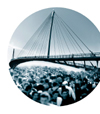
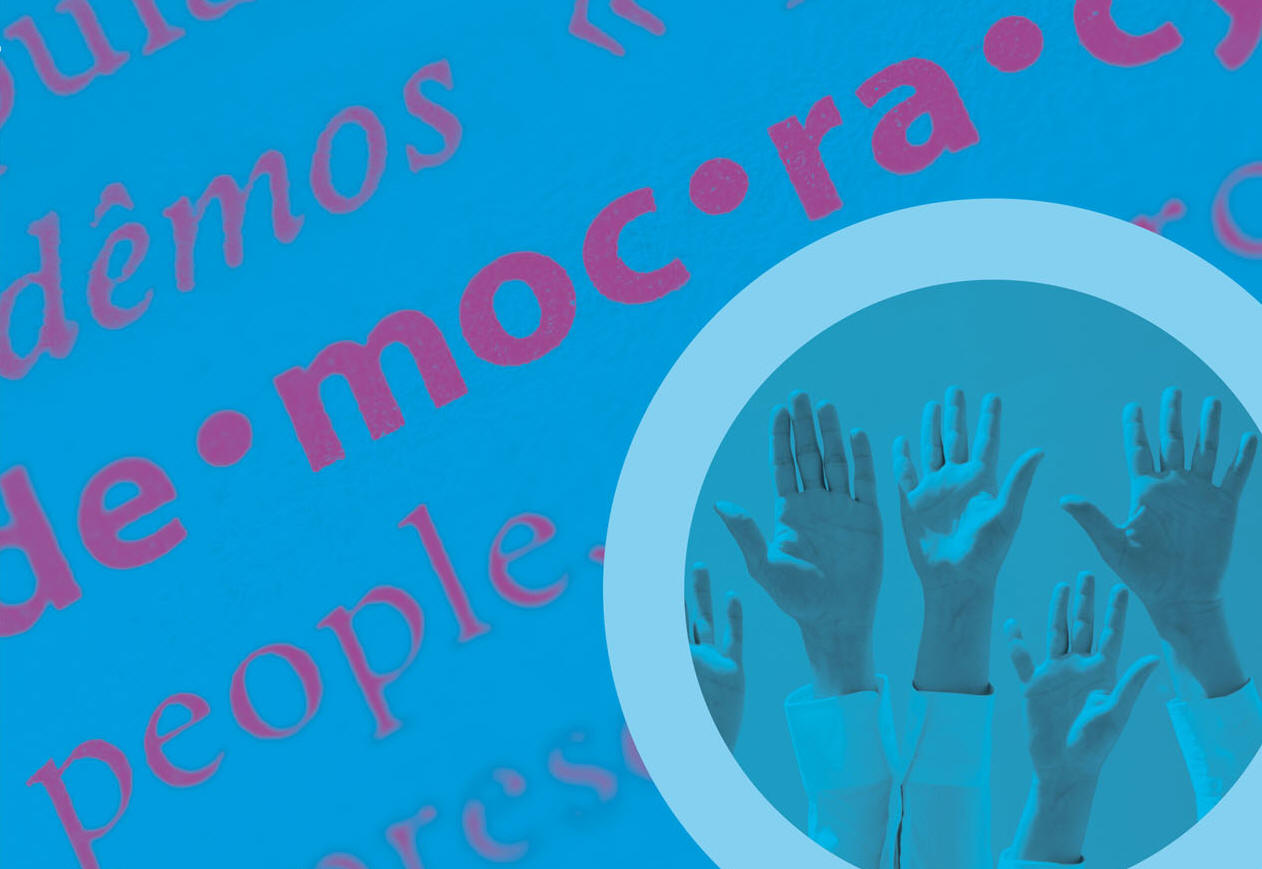
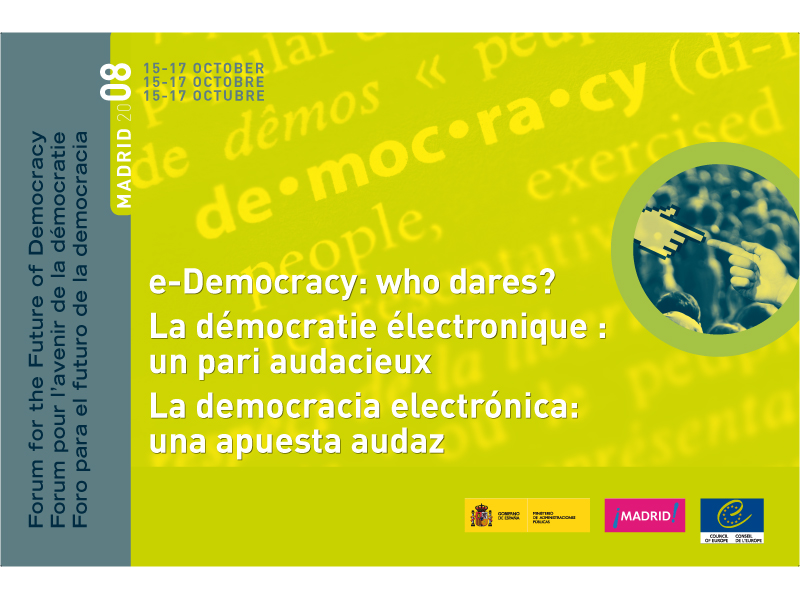
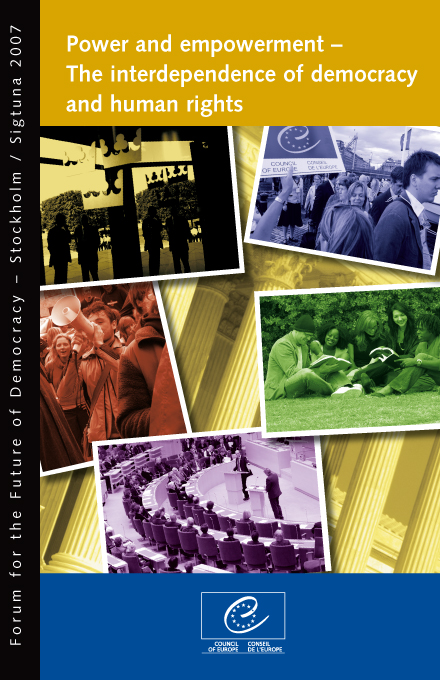
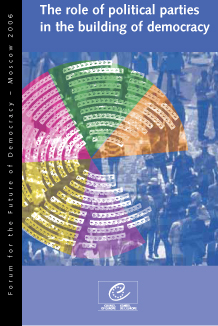
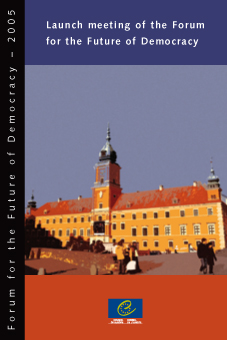
 Print
Print  Send
Send  FRANCAIS
FRANCAIS